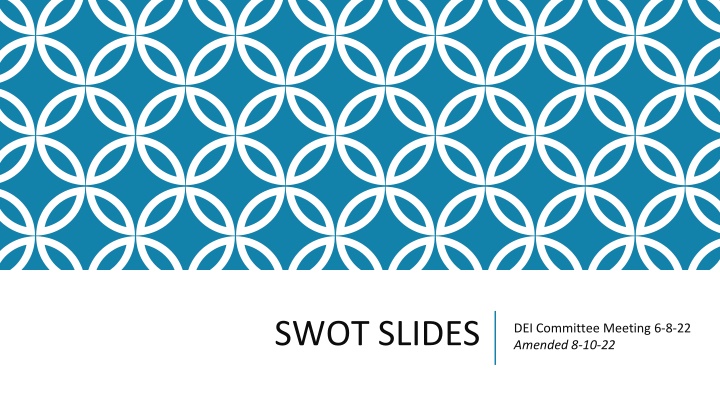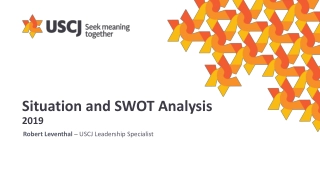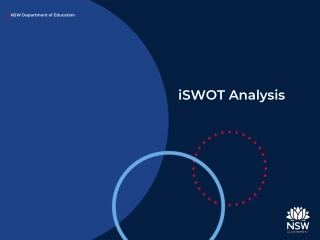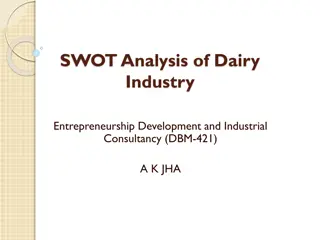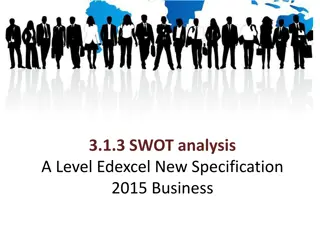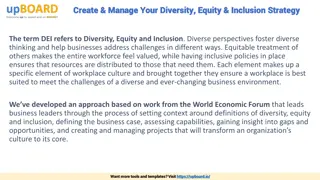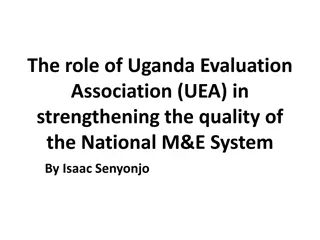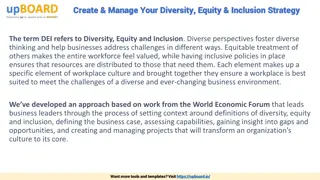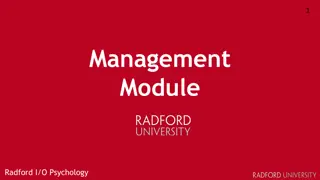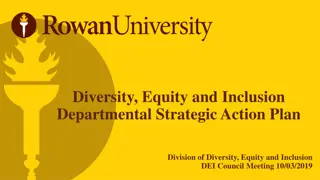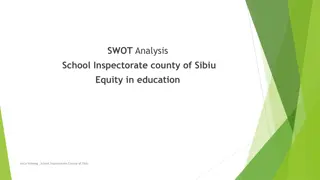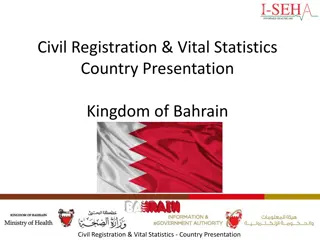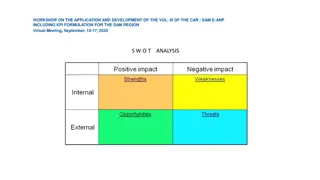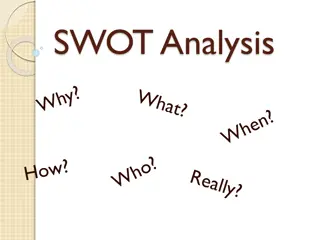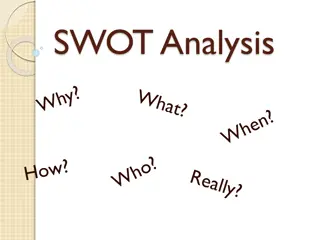SWOT Analysis for DEI Committee Meeting: Strengths and Weaknesses
This SWOT analysis highlights the strengths and weaknesses identified during the DEI Committee Meeting, focusing on limited diversity, community perceptions, financial constraints, and opportunities for growth and improvement. The analysis delves into the challenges of promoting diversity, equity, and inclusion in Cape Elizabeth, exploring potential barriers and strategies for success.
Download Presentation

Please find below an Image/Link to download the presentation.
The content on the website is provided AS IS for your information and personal use only. It may not be sold, licensed, or shared on other websites without obtaining consent from the author.If you encounter any issues during the download, it is possible that the publisher has removed the file from their server.
You are allowed to download the files provided on this website for personal or commercial use, subject to the condition that they are used lawfully. All files are the property of their respective owners.
The content on the website is provided AS IS for your information and personal use only. It may not be sold, licensed, or shared on other websites without obtaining consent from the author.
E N D
Presentation Transcript
SWOT SLIDES DEI Committee Meeting 6-8-22 Amended 8-10-22
STRENGTH WEAKNESS 1. Limited racial and ethnic diversity, socio-economic diversity 2. Limited housing diversity to welcome wider range of socio-economic diversity 3. Perceived to be a white and affluent town; Not considered welcoming of individuals from marginalized groups 4. Cape citizens value things that counter DEI work (preservation of rural character, bedroom town status, natural environment, etc.) (*perhaps perspective from limited number of residents) 5. Bedroom community means limited commercial tax benefits for town funding. Funding comes from property taxes, etc. 6. Focus of town on NOT expanding business and staying a bedroom community 7. Community members feel comfortable, don t need to change 1. Support from Town Council, recognized need for dedicated committee 2. Extremely high education level across the community (unique) 3. Influx of new people and thinking coming from larger cities/states; knowledge base, supportive of DEI 4. Proximity to Portland, access to knowledge and experience OPPORTUNITY THREAT 1. People afraid of change, of losing something, loss. This is how it s been done 2. Not a full understanding of what DEI is across the community 3. NIMBYism quiet (or not) undercurrent, will make DEI work difficult to achieve 4. Defensive responses to implicit biases not criticism of character, limited awareness of DEI 5. White privilege 6. Financial anxiety around the state of the economy, property evaluations, bond issue for schools 1. Opportunity for us to weave this work through every office that serves our community. Educate our community, town council meetings, etc. 2. Ability to access knowledge base of citizens who lead significant DEI initiatives at their workplace 3. Tap into young people (high school, college age) who are passionate about DEI 4. Open DEI committee mandate have ability to design from scratch 5. Data collection and actually learn about the values and needs (focus groups, IDIs). Listen, hear, learn. Method on including their voices
STATUS Cape Elizabeth s Diversity Equity and Inclusion WEAKNESS STRENGTH Things that are not successful or put your town at a disadvantage The characteristics of your town that are successful and set it apart from others S T W O THREAT OPPORTUNITY Areas where there is chance for change or external factors that offer a chance to make improvements Conditions that are harmful to the success or character of your town or that could damage its chances to improve
WEAKNESS 1. Limited racial and ethnic diversity, socio-economic diversity 2. Limited housing diversity to welcome wider range of socio-economic diversity 3. Perceived to be a white and affluent town; Not considered welcoming of individuals from marginalized groups 4. Cape citizens value things that counter DEI work (preservation of rural character, bedroom town status, natural environment, etc.) (*perhaps perspective from limited number of residents) 5. Survey responses included no mention of value placed on welcoming, growing 6. Have not been able to connect with people to collect data 7. Question about willingness 1. Of citizens to participate and buy-in to DEI work (are Cape citizens only showing casual support (e.g., flags, signs))? 2. Of citizens make trade offs, i.e., give up some perceived prestige/power 8. Unknown DEI committee budget 9. Does this committee have teeth? Can we make change, and how? ? Unclear 10. Limited diversity represented by DEI committee members 11. Bedroom community means limited commercial tax benefits for town funding. Funding comes from property taxes, etc. 12. Focus of town on NOT expanding business and staying a bedroom community 13. Community members feel comfortable, don t need to change STRENGTH 1. Support from Town Council, recognized need for dedicated committee 2. School system has momentum with their DEI committee 3. Community DEI knowledge: Cape citizens are employed by major companies, higher ed, etc. that are doing DEI work 4. Extremely high education level across the community (unique) 5. Outside admiration for Cape Elizabeth, natural beauty, education, quality of life desirable place to live 6. Influx of new people and thinking coming from larger cities/states; knowledge base, supportive of DEI 7. Proximity to Portland, access to knowledge and experience 8. Strong public school system 9. Open spaces available for gatherings OPPORTUNITY 1. Opportunity for us to weave this work through every office that serves our community. Educate our community, town council meetings, etc. 2. Ability to access knowledge base of citizens who lead significant DEI initiatives at their workplace 3. Willingness to listen to create a more diverse inclusive and equitable town 4. Move needle on equity 5. We see a casual desire to do the right thing, but there are people who want to engage 6. Tap into young people (high school, college age) who are passionate about DEI 7. Young people have missed out on community during covid, this is an opportunity for them to reengage 8. National discussion is heated; local and compassionate conversations move the needle 9. Open DEI committee mandate have ability to design from scratch 10. Race traitors despite our whiteness we can represent the diversity of marginalized communities (how speak for them without tokenizing them) 11. Data collection and actually learn about the values and needs (focus groups, IDIs). Listen, hear, learn. Method on including their voices 12. Can be on forefront of DEI efforts to support increasing diversity. How we embrace all marginalized people? THREAT 1. People afraid of change, of losing something, loss. This is how it s been done 2. Not a full understanding of what DEI is across the community 3. NIMBYism quiet (or not) undercurrent, will make DEI work difficult to achieve 4. Midterm elections, presidential elections 2024, polarized politics around DEI 5. Echo chamber to like-minded people 6. Defensive responses to implicit biases not criticism of character, limited awareness of DEI 7. White privilege 8. Risk of another pandemic people turned inward again 9. Climate change rising sea levels, flooding, exacerbate housing crisis, limit ability to provide affordable housing 10. Environmental racism, intentional neglect of places, zoning that disproportionately put marginalized people in undesirable locations 11. Financial anxiety around the state of the economy, property evaluations, bond issue for schools
